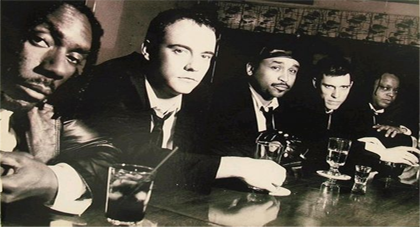
by Nicole | Oct 17, 2010 | Creative Writing, Fiction, Writing
Ethan trudged through the several inches of freshly fallen snow, as he passed the church. He was bundled head to toe, his body attempting to avoid the arctic wind coming from the lake. Sarah was a few steps behind him. She was weaving through people like a taxi in a traffic jam. If only she didn’t need all that shit she’s carrying! His thoughts were at the tip of his tongue. His mind was threatened their release upon further irritation. His thoughts were interrupted by a piercing scream. “ETHAAAAAAN!” What now, he asked himself. He then turned around when he reached the corner, and was speechless.
“Ethan! Get back here and help me!” Sarah shrieked at him. She was on one foot, trying desperately to hold her Gucci purse, briefcase, two shopping bags, and boot in one hand, while using her other hand to hold on to the light pole. “My D & G’s!” came squeaking out in between her sobs. Ethan came running up. He grabbed her bags and had her hold on to his arm to give her balance. The heel broke off her boot. Fantastic. This is just what I need when we’re already running late! His mind was interrupted by her hyperventilating.
“They…they… they’re ruined!” she wailed. A few passersby stopped to stare for a moment. Crazy people that yell were everywhere. They were considered a part of the scene in a city like this. The audience hurried along their way when the light changed.
“Come on Sarah, quit being so dramatic. You can get another pair…” He had to choose his words carefully, or he would say something to piss her off. “Is your ankle ok?”
“I don’t care about my ankle! I loved these boots!” Of course she doesn’t care about her ankle. Must not hurt that much. I swear, if she cared half as much about me and her life as she does about those damn boots and bags, things might actually work out.
“I told you not to wear those today. You saw the weather forecast with me! You shoulda listened!” His voice turned sour as his frustration became harder to control. She tried to interrupt him. She was cut off quickly.
“What!? You knew what you were getting into. You better tough it out. We’re almost to my building! I’ll carry your things, hang on to my arm and let’s get going! It’s freezing out here!” She’s about to hit my last nerve. I don’t know how much longer I…
Sarah slapped him. He was brought back to reality quite quickly. He was dumbfounded. After all I do, this is what happens? “What the hell is wrong with you? I’m trying to help –“
“You are not helping! You are being rude! Get me a taxi so I don’t have to spend another minute with you! You can walk!” I can walk? Really? Taxi!
He stood there, so still that you barely saw his breath in the frigid air. “Are you serious?” he finally mustered. “You want a cab? When we’re not even 10 blocks away? Because you don’t want to spend another minute with ME? Unbelievable, Sarah. I’ve just about had it.”
“Had it with what?!” she shot back hastily. It really didn’t matter how she sounded, the outcome would still be the same.
“Had it with this – what are we even doing here?! I’m always catering to your unappreciative ass, making sure I work overtime every single week to take you to your expensive restaurants, and to your designer shops…” his words were dripping with anger, resentment, frustration, and pure hatred. “I just… I can’t do this anymore! You never say thank you, you never tell me you love me anymore, and I feel like you just use me!”
Sarah rolled her eyes. “How in the hell do I use you? I don’t need you, in case you didn’t know! I can do just fine on my own!” Yeah, right, Ethan mumbled. Oops. Did I say that out loud? “Look – I used to care a lot about you. The last couple years you have just drained me. I have been trying to figure out a way to say this, but I avoided it for so long… I thought maybe if…”
“Maybe if what? Maybe if you pretended to love me? Pretended to care? What the hell is your problem?! I’m so done with you! You better pack your stuff and leave as soon as we get back!” she yelled, avoiding his gaze.
“Me, pack my stuff, in MY PLACE?!” Ethan couldn’t believe his ears. She was trying to kick him out of his own place. “I don’t think so!”
Their fight on the street lasted another forty-five minutes. It ended with an angry Sarah being hauled away by the cop who happened to pass by just as she went to stab him with her broken stiletto heel. She screamed at Ethan. She shouted everything from “I love you, don’t do this” to “you’re such a pig, I hate you!” He just stood on the street corner and let his hands fall to his side. He was completely flabbergasted. The police took her to a hotel. He would have a night free of bitching. A night free of her incessant moaning. A night free of his utter unhappiness. He was for sure that after this incident, they were through. Ethan readjusted his scarf and hat, put his gloves back on. He continued home, where he immediately packed a bag and wrote Sarah a quick note.
Sarah –
I’m finished. We have to talk later, because I can’t deal with how things are going anymore. I’m going over to Josh’s for a few hours, so you should pack your things and go stay with your sister. I think we need a few days to cool off – don’t call or text me, please. I need to clear my head and think about things. I’m sorry.
-Ethan
He slowly put the pen down on the kitchen counter, and stood up straight. Ethan knew it was over, but it was the best thing to do. He took the note and placed it on the table in the foyer. With that, he took a deep breath and walked out the door.

by Nicole | Jul 28, 2010 | Creative Writing, Poetry, Writing
Thunderstorms have always helped get my creative juices flowing. Lucky for me, a nice storm came passing through this evening. I was inspired by this and Writer Wednesday to pen some poetry. Enjoy. :)
Thunder roars above,
lightning streaks across the night sky,
Rain begins to fall.
Listening to rain
slowly hitting the pavement
relaxes my mind.
The sky opens up
for a midsummer cool down,
providing comfort.
The rain drops heavy
while the wind picks up a notch,
Clearing out our troubles.
Thunder and lightning,
dark clouds hover above us.
Rain drenches the earth.

by Nicole | May 7, 2010 | Current Events, Education, Life, Past Blog, Writing
Technology is changing literacy. It is progressing, giving virtually anyone with access the tools they need to expand their own personal literacy. In our day and age, there are many opportunities to become more literate, and all the while advance with technology. How exactly is technology influencing change upon the face of literacy? The constantly changing nature of technology and the way it intertwines with the evolution of literacy is fascinating. From learning ways to communicate, read, and write, to staying up to date with the latest advances in technology by way of computers and the internet, we as humans have always strived to get to the next step. Starting with one of the more obviously evolved technologies, computers have changed many aspects of literacy.
Not too many years ago, when someone needed to do research, they spent most of their time in libraries, archives, and interviewing people face to face or over the telephone for information. Now, most information is made readily available by the click of a button. Online databases harbor many scholarly articles and journals for researchers to utilize, making their process much simpler and less time consuming. As of late, a newer way of researching has hit the internet, called hypertext. This new form has helped researchers look for the most relevant information for their topics, and be able to save time by not searching word-by-word through a document. Hypertext also gives the reader the opportunity to make decisions on which parts of information will be most helpful when writing a research-driven document.
Hypertext has the ability to change how we will write, read, teach, and how we consider written works. Nancy Patterson, the author of “Hypertext and the Changing Roles of Readers” reports that “hypertext users…can challenge text immediately, or as immediately as the reader can write a response and link that response to the author’s text.” (Patterson 76). Technology has helped in such a way that if someone does not agree with some research they found and have evidence to back it up, they can contact the author of the hypertext article with their findings. Also, it is beneficial in many ways (writers of computer manuals especially) and promises to be a technology advancement in academics – mainly scholarly journals, where students can easily maneuver between citations in a work to an author’s previous publications.
Searching hypertext documents makes research easy for readers to gather and organize information. Readers are relying on the writers to separate their topics to be “reader friendly” and hypertext really gives the reader all the control versus the writer being in control of what the reader chooses to take in. The reader can choose what links to follow, therefore choosing what they read instead of ‘wasting time’ on content that might not be relevant to their topic. Davida Charney, a professor of rhetoric and composition, also wrote how hypertext may be changing reading in her article The “Effect of Hypertext Through the Processes of Reading and Writing” that “readers traditionally rely on the writer to select topics, determine their sequence, and signal relations between them by employing conventional discourse cues” (Charney 94). By relying on the writer to have well organized information makes the research process much simpler for readers to gather and organize their information according to relevance. It makes the process much easier to endure, but yet provides all the information in the most recent form.
There is a good and bad side to hypertext researching. Even though it is up to date and is a simpler way to conduct research, the fact that there can be issues of credibility with some documents is something one must consider. Internet websites like Wikipedia. Users from all over the world are invited to add their own edits to entries on the online encyclopedia. The idea behind this is to have a knowledge bank that has so much information for all to enjoy. This gives users the chance to edit sources they view on the website. Everyone can be a reader and a writer at the same time. With this comes the issue of fraudulent information and author credibility. Dennis Baron, a professor of English and Linguistics at the University of Illinois, writes “as more and more people turn to the World Wide Web for information, and as students begin relying on it for their research papers, verifying the reliability and authenticity of that information becomes increasingly important, as does revisiting it later to check quotations or gather more information” (Baron 82). I believe this concern for fraud meshes with academic documentation styles in quite a few ways, the highest concerns being how does one know what style is being cited correctly online? There are many citation machines available online for students and researchers to use, but how do we know if these are credible? People are safer using published books on documentation, and reputable sources online to ensure credibility of their documentation.
Baron also reviews various ways of deception and fraud that can be committed in the computer age, such as altering graphics and text available online. Other things that are computer related are currency fraud, where some will counterfeit money using a computer and high tech printer to reproduce money. Computers have brought so many changes to our society, and Baron also states that computers “offer new opportunities for producing and manipulating text…they also present new opportunities for fraud.” (71) Baron says that the computer is just the “latest step in a long line of writing technologies” (72) and that some of the biggest problems lie within authentication.
Despite the bad news of fraud floating around on the World Wide Web, the internet is a place where many people have found their writer within, and use the internet to become self published. Blogging and social networking websites are allowing people to write more than ever. Take for instance the free publishing tools WordPress and Blogger offer online. Publishing basics made easy through these free sites. Then here comes the bigger question: who has the time to blog? As of last year (2008), there were about 133 million blogs worldwide. Granted, some of these blogs are now idle and not updated, but nevertheless are still out in cyberspace for all to read. People worldwide are finding the internet to be a wonderful outlet to post their ideas, thoughts, rants, raves, and who-knows-what-else-comes-to-mind. Scott Rosenberg, the author of “Say Everything,” actually discusses many genres of blogging, including life blogging, in a live webcast from the Diane Rehm show (based out of Washington state). This term relates to those who blog strictly about their lives and what they are up to on a daily basis, and even including videos of their daily adventures. Sometimes it is easier for someone to talk to a camera than it is to sit down and write, and with the internet the way it is today, it makes it easy for everyone to blog. Talking about this subject with a colleague in the writing center, we both came to the conclusion that people are writing more than ever. Often, bloggers use social networking and social media sites to make connections with other writers. These sites are becoming more and more popular, giving users the freedom to publish whatever they choose to write.
Social networking has becoming one of the biggest fads to have hit the internet. Whether it is posting a “status update” on Facebook, publishing an entry on a personal blog, or a “tweet” through Twitter, people really are reading and writing more than ever. It seems the world is centered on this fascinating way of communicating – and why not? Educating people on the new forms of literacy is imperative to move forward in today’s world. It is all around us, Elizabeth Thoman and Tessa Jolls talk about how our culture is constantly being reshaped by the ever-changing forms of literacy. “From the clock radio that wakes up…until we fall asleep watching the late night talk show, we are exposed to hundreds – even thousands – of images and ideas from not only television but also websites, movies, talk radio, magazine covers, e-mail, video games, music…media no longer just shape our culture – they are our culture” (Thoman, Jolls 18).
We are constantly surrounded by things that have to do with literacy, and some do not realize that even watching television and playing video games can help people expand their own personal literacy. Video games are now being considered aids in literacy. Thoman and Jolls also discuss how video games “are actually quite intricate learning experiences that have a great deal to teach us about how learning and literacy are changing in the modern world” (Thoman, Jolls 21). I can agree with this fully – new games such as “Brain Age” and various other ‘pop-cap’ games focus on hand-eye coordination and reading directions to get you through to the next level. If people do not have basic literacy skills and wish to advance while playing their video games, it will seem impossible. With television, there are many shows on that are educational – even entire networks like the Discovery channel focus on educational programming. Nowadays, being literate doesn’t mean simply being able to read. It means to understand new mediums of technology; books, movies, television, billboard advertising, and the list could go on for days.
The internet provides the most up to date everything – research, news, blogs, ‘updates,’ weather, and even various modern tools for education. The internet and technology associated with computers is changing the way the world works, without a doubt. Keeping people in the know for changes in technology will only help our society advance. It is undeniable that literacy has been and will continue to be a changing force in our lives, especially when thinking about it from a technological perspective.
(photo credit: Rosenblum TV.com)

by Nicole | Mar 16, 2010 | Published
March 16, 2010
“Very inspirational!” “Amazing program!” “Sincerely tremendous!”
So commented some attendees of the 21st Annual Joseph Taylor Symposium on their evaluation forms. The event organized by the Department of English and themed “Voices in the City: Language + Literacy + Urban Life,” focused on the diverse voices of spoken and written word and innovative efforts to teach the craft of communicating through writing in the urban school environment.
The first session of the February 26th event showcased local poets and writers who use their writing to touch on cultural and urban issues. Moderated by English Department graduate student Tiffany Kyser, the panel included Allyson Horton, Derrick Slack, and T.J. Reynolds. These young Indianapolis writers took turns reading and performing pieces of their own and famous artist’s work, as well as offering their opinions on just how important having an audience can be.
At the end of the first session, Reynolds invited the audience to participate in a short freestyle rap. Throwing together thoughts on the spot and asking the audience to add rhythm by finger snapping, Reynolds was able to show listeners just how they could be a part of the performance.
“I feel like an audience is a part of the creative process; I feel like sharing what you do is a part of the creative process… as an artist, I think the job is to ask the question, rather than answer it.” Allyson Horton said, “We feed off of the audience’s energy.”
The theatrical, powerful performances by the three were enough to make some audience members laugh and cry. Attendee Lida Rogers said that “at one point I was crying and thought, oh well – I’m among great company!”
In the second panel, teachers and mentors, affiliated with the National Writing Project, displayed new approaches to working with language in multilingual, multicultural Indianapolis. Moderator Susan Adams, manager of Project Alianza at the College of Education at Butler University, was joined by local teachers Charlie Geier of MSD Washington Township Schools, Nikia Garland of Broad Ripple High School, and Joe Vanegas of the Orchard School.
Getting children to write and express themselves through words is a focus of the three teachers. Geier said, “I found that creating a safe place for children to write is probably the single most important thing.” After hosting a mini poetry slam where the children could invite their parents and teachers, Geier reported how proud his students were of their work, and how proud the audience was, saying that “people started to believe in these kids – sometimes for the first time.

Guests of the Symposium were invited to attend a poster session featuring the work of students, faculty, and community members. Showing research and reflection on issues surrounding language and literacy practices in urban culture, the subjects for the poster session ranged from documenting neighborhood histories in Indianapolis to recovering Native American language, from black femininity to an intercultural study in health literacy and adherence.
During the luncheon, the Taylor Awards for Excellence in Diversity were presented by Chancellor Charles Bantz. The award recognizes individuals and programs that have contributed to climate for diversity on the IUPUI campus. Individual winner Assistant Professor of English Jennifer Thorington Springer is considered a campus leader in curricular and co-curricular transformation for the promotion of diversity.
Thorington Springer, together with Liberal Arts faculty members Gina Sanchez Gibau (Anthropology) and Najja Modibo (Africana Studies), is also a member of the Multicultural Teaching Community of Practice (MTCOP), the program recipient of the 2010 Taylor award.
Organized and facilitated by the Center for Teaching and Learning, MTCOP has displayed a passionate energy to facilitate building teaching and learning communities that incorporate an inclusive classroom atmosphere. Co-chairs Khadija Khaja, Ph.D., of the School of Social Work at IUPUI, and Kathleen Grove, J.D., director of the IUPUI Office of Women, accepted the Taylor Award on behalf of MTCOP.
Following the awards, keynote speaker Patricia Smith took the stage. Smith was a 2008 National Book Award Finalist for her book, Blood Dazzler, which chronicles the human, physical and emotional toll exacted by Hurricane Katrina. She has also been featured on HBO’s Def Poetry Jam, and is a four-time champion of the National Poetry Slam. “Patricia Smith was amazing—thank you for bringing her here,” wrote one luncheon guest.” Another commented, “I’d give the speaker a 10 out of 5.”
The event was a fitting tribute to Joseph T. Taylor, the first dean of the School of Liberal Arts and a notable beginning for the Symposium’s third decade.
The 22nd Annual Taylor Symposium will be organized by the Department of Geography and held in February 2011.
Photo: Panel two participants Joe Vanegas, Charlie Geier and Nikia Garland (from left) with moderator Susan Adams. [Event photos]
-Nicole Mathew, Liberal Arts News Bureau
News Categories: Africana Studies | Anthropology | Civic Engagement | Event Announcements | English | Student Accomplishments
(Published March 16, 2010. Written for the the School of Liberal Arts News Bureau, IUPUI.)

by Nicole | Nov 10, 2009 | Poetry, Prose, Writing
Dearest dMb family,
I wrote this prosy poem last semester, and wanted to share it with you. I hope you enjoy, and I can’t wait to see some of you on the next tour.
Peace, Love, and dMb forever!
Seek Up An Emotion
The melody floats above the crowd, creating an audible sculpture that drenches the earth with love. The bass keeps us pulsating, and the strings slide with such grace. While the snare echoes in the fog, the Taylor drips with deep emotion. A mellow note from the saxophone softens the mood. Coming together, they fill the souls of “five billion proud.” Letting the music flow through our veins, the dancing silhouettes become one shadow. At this moment, our lives are suddenly swept away.

by Nicole | Nov 4, 2009 | Past Blog, Writing
This afternoon after running some errands, I found myself at a local Starbucks. I couldn’t say no to complementing this beautiful fall day with a soy chai latte. :) While waiting for the barista to make my order. We got to chatting, and she asked me where I worked. After telling her I tutor writers on campus, it opened the door for a brief discussion on writing, and how therapeutic it really can be.
Writing is something I do for many reasons. I use it mostly as a release and therapy, to improve my education on certain subjects, to communicate… really the list goes on. One thing I have learned through my writing is that I must write for myself. I used to always think “what do people want to read?” I soon found out I wasn’t happy with writing with that question in mind. I produced better poetry, prose, and even journal entries when I was writing from my heart, and not for the eyes of others.
A very good friend told me to start writing for myself. When you let go of all apprehensions of what to put down on to paper, you might be surprised to see what you’ve composed. If you can let go of the fear inside of what someone might think if they read your writing, you will open so many doors. I can personally testify to this – when I took the poetry class last year I learned how to let go of some of that fear. It wasn’t gone, and it still isn’t. What is important here is that I try each time I jot a paragraph in my journal, write a blog, or make a note in my planner. If I write for me, I can let things go. It has worked in the past. Sometimes I feel the struggle of when I don’t know what to write… the thought crosses my mind “I wonder who will read this…” but then I stop myself. It doesn’t matter who will read what I write, because I write for me. Of course, I’d love to gain a large following and write books that make the best seller’s lists. I realize now that the goal is obtainable, since I have stopped writing for readers. I write for me, and that’s what really makes me happy.
Page 13 of 14« First«...10...121314»





